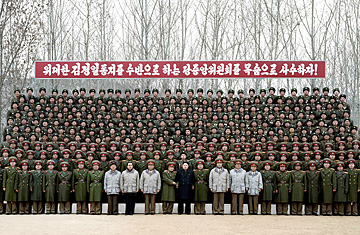
This picture taken by North Korea's official Korean Central News Agency (KCNA) on January 1, 2012 shows new North Korean leader Kim Jong-Un (front row-C) posing for photos with soldiers of the Seoul Ryu Kyong Su 105 Guards Tank Division of the Korean People's Army honored with the title of the O Jung Hup-led Seventh Regiment at an undisclosed place in North Korea.
(5 of 6)
Today everyone in a position of power in North Korea is at least twice Kim Jong Un's age and vastly more experienced. But they will nonetheless snap off salutes to him. Any deviation has meant at minimum a sentence in North Korea's notorious gulag and at worst death. Consider one especially brutal case: in the mid-1990s, just as the famine that would eventually kill millions of North Koreans was taking hold, reports of grumbling and dissent in a prominent Korean People's Army's division reached Pyongyang. Kim Jong Il, according to an intelligence source, had the unit's officer corps--several dozen men--arrested and then made the enlisted men watch what happened next. The arrested officers were forced to lie in the middle of a road, their hands and legs tied. Several tanks rumbled forward and ran back and forth over the officers, crushing them to death. This combination of ruthlessness, ideology and isolation leads many observers of North Korea to believe that "there is no question Kim Jong Un will be making the decisions now," says a former intelligence analyst in East Asia.
He may make the decisions, but they will be based on information filtered through those around him, men who are not peers but elders. In addition to Jang, the inner circle includes Kang Suk Ju, the top foreign policy adviser who famously admitted to U.S. diplomats in 2002 that Pyongyang had a uranium-enrichment program to go along with its plutonium-based nuclear program. The key military official is Ri Yong Ho, chief of the general staff, who was directly across the hearse from Kim Jong Un during Kim Jong Il's funeral procession through Pyongyang.
These men and other senior officials are deeply vested in the status quo and probably resistant to any change that would weaken their positions. Yet unlike in 1994, when Kim Jong Il came to power, many North Koreans now have some sense of the outside world. They haven't been abroad, as Kim Jong Un has. But they watch TV shows and movies on DVDs smuggled from China--South Korean soap operas are particularly popular--and some access Chinese cell-phone networks near the border and chat with relatives who have fled the country. In short, they know life beyond their borders is vastly different--and better.
Pyongyang's Bubble
Two issues are critical for North Korea. Will it liberalize its economy, as its chief patron China did more than 30 years ago, and finally allow its citizens to get at least a whiff of the prosperity that surrounds them in East Asia? And will it give up its pariah status as a rogue nuclear state--a choice the other six-party governments practically begged Kim Jong Il to make, to no avail, in return for economic and diplomatic blandishments to help reinvent the country? The time that young Kim Jong Un spent in Switzerland, dressing in Dennis Rodman jerseys, playing video games and befriending Westerners, prompts some to think the young man must know these decisions are no-brainers. He experienced the outside world and then witnessed the abject, criminal poverty of his own country. After all, didn't Deng Xiaoping, the mastermind of China's opening, spend time in France with Zhou Enlai when he was young?
